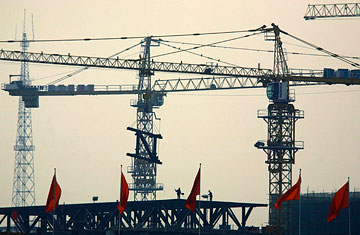
Cranes tower over construction workers atop a building under renovation located near Beijing's Tiananmen Square on March 3, 2009
But anyone thinking China is going to be the engine that pulls the rest of the world out of the swamp should probably reconsider what Premier Wen Jiabao said during his visit to London in February: that for China to maintain its own economic growth "will be the biggest contribution to the whole world in the face of the financial crisis." (Read "China's Auto Bailout Takes a Different Route.")
There was clear disappointment as Asian stocks slumped after Wen offered no new stimulus spending when he delivered his annual work report March 5 at the opening of the National People's Congress. At follow-up sessions the following day, top officials offered more details on its stimulus plan, saying it would go to transportation infrastructure, housing, energy saving technology and health care. While they didn't rule out additional funds, they said decisions on whether to throw more money at its problems would be based on analysis of how well current programs are working. (See photos of China's electronic waste village.)
The country's plan "should be front-loaded and forceful," said China's central bank governor Zhou Xiaochuan. "If confidence collapses, it's too late for us to react. It takes a long time to recover. We learned this from the experience of other countries." Zhou said he saw some signs of improvement in China's economic data, implying that big increases in stimulus spending were unlikely in the near future. In other words, if the rest of the world wants a rescue, it should save itself.
Some economists argue it is unrealistic to expect that China, which saw its slowest growth in seven years last quarter, will be able to boost its domestic demand through short-term spending enough to mitigate steep declines in global trade. "The idea that China will be helping the rest of the world is a myth," says Ben Simpfendorfer, a Hong Kong-based China economist for the Royal Bank of Scotland. "Almost half of what it imports is related to export processing. A large share of the remainder is commodities. It imports little for its own consumption. That befits its status as the world's largest manufacturing center."
Chinese officials expressed "confidence" — a word that was repeated frequently during March 6 press conferences — that their program would offer significant benefits for the country's consumers and corporations. Zhang Ping, head of the National Development and Reform Commission, outlined an infrastructure-heavy program that includes $219 billion for roads, railways and other transportation, $146 billion for recovery from disasters including the Sichuan earthquake, $58 billion for improving housing for the poor, $54 billion for rural development programs, $54 billion to boosting technology and innovation at Chinese corporations and $30 billion for energy saving and anti-pollution measures. Health care will get $22 billion, less than 5% of the total.
As Zhou and Zhang talked numbers Thursday, they emphasized that China is doing all it can, but the rest of the world — and particularly the U.S. — needs to begin pulling its weight again. Asked what further steps China might take, Zhou replied, "What we are waiting for is, what will happen in the country where the crisis originated. If you can explain what that country will do, we can say what we will do."
Outside official circles in China that sentiment is stated more bluntly. "The U.S. is definitely a dragger. It's not a pusher. It's not a puller," says Chen Xingdong, a Beijing-based China economist for BNP Paribas Securities. "The U.S. is not doing the right thing. It's not acting."
